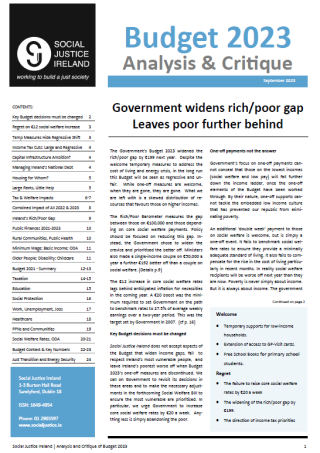Government widens rich/poor gap. Leaves poor further behind.

The Government’s Budget 2023 widened the rich/poor gap by €199 next year. Despite the welcome temporary measures to address the cost of living and energy crisis, in the long run this Budget will be seen as regressive and unfair. While one-off measures are welcome, when they are gone, they are gone. What we are left with is a skewed distribution of resources that favours those on higher incomes.
The Rich/Poor Barometer measures the gap between those on €100,000 and those depending on core social welfare payments. Policy should be focused on reducing this gap. Instead, the Government chose to widen the crevice and prioritised the better off. Ministers also made a single-income couple on €50,000 a year a further €192 better off than a couple on social welfare.
The €12 increase in core social welfare rates lags behind anticipated inflation for necessities in the coming year. A €20 boost was the minimum required to set Government on the path to benchmark rates to 27.5% of average weekly earnings over a two-year period. This was the target set by Government in 2007.
Key Budget Decisions Must be Changed
Social Justice Ireland does not accept aspects of the Budget that widen income gaps, fail to respect Ireland’s most vulnerable people, and leave Ireland’s poorest worse off when Budget 2023’s one-off measures are discontinued. We call on Government to revisit its decisions in these areas and to make the necessary adjustments in the forthcoming Social Welfare Bill to ensure the most vulnerable are prioritised. In particular, we urge Government to increase core social welfare rates by €20 a week. Anything less is simply abandoning the poor.
Gambling with the lives of Ireland’s poorest and most vulnerable is totally unacceptable. Government should reverse its decision on core welfare rates and increase these by €20 a week in the upcoming Social Welfare Bill. Anything less would mean that Budget 2023 confirms Government has abandoned those who need its help most.
One-off payments not the answer
Government’s focus on one-off payments cannot conceal that those on the lowest incomes (social welfare and low pay) will fall further down the income ladder, once the one-off elements of the Budget have been worked through. By their nature, one-off supports cannot tackle the embedded low income culture that has prevented our republic from eliminating poverty.
An additional ‘double week’ payment to those on social welfare is welcome, but is simply a one-off event. It fails to benchmark social welfare rates to ensure they provide a minimally adequate standard of living. It also fails to compensate for the rise in the cost of living particularly in recent months. In reality social welfare recipients will be worse off next year than they are now. Poverty is never simply about income. But it is always about income. The government is continuing to betray the social contract that, at critical times in the past, generated solidarity and social cohesion in this republic.
In addition, the Government’s focus on one-off payments assumes that all will be well for low-paid workers and welfare-dependent households next year. This is a huge gamble that may backfire on the least well-off among us. It is gambling with the standard of living of Ireland’s poorest and most vulnerable people and is totally unacceptable as a strategy.
Consider, for one, how it will ramp up anxiety levels in low-income households considering sending a young person to college next year, or embarking on a course of private medical care or moving to a larger apartment. For them, after this budget, there remains a fraught present and a bleak future unless Government begins to systematically combat income poverty.
Expecting the impossible of the poor
This is particularly worrying in light of the impact of the pandemic, and then the cost-of-living crisis, on the weakest among us. A total of 595,000 people in Ireland are living in poverty, of which around 164,000 are children.
In 2023 the core rate for Jobseekers Benefit for a single adult (aged 25 +) will be €220 per week. €220 a week to provide for accommodation costs, heat, light, food, clothing, personal care, entertainment, education, transport, tv licence, communications, refuse collection, household goods, health, insurances, bank charges and in an ideal world allow for savings for contingencies.
That is an impossible challenge for people on such a low income. Yet Government decided not to increase the core payments by €20, not to move to benchmark this welfare payment at the required level, not even to protect its true value since last year. Instead they decided to increase the income going to a person with an income of €100,000 by more than €900 a year.
Not every household in crisis
Every household is experiencing rising prices caused by inflation. But not every household is in crisis. It is well documented that low-income homes suffer most: people on low hourly wages or fixed incomes such as welfare entitlements. Supporting these households requires ongoing targeted measures, not one-off payments.
Failures on taxation policy
€1.26bn was allocated to tax initiatives in this Budget. We regret that 67% of the resources devoted to income tax changes were allocated to benefit higher rate taxpayers. These are permanent changes unlike a major part of the resources allocated to poorer people which are temporary.
No evidence of just transition
We welcome the €2.6m to support delivery of the Circular Economy Strategy. However Government missed the opportunity to invest in and secure our energy infrastructure, progress the implementation of the Climate Action Plan and ensure a just transition to a green economy.
Housing
The increased capital allocation of €40m for housing means funding is insufficient to meet the current target let alone meet the increase of €1.4bn required to increase the target of 9,000 social homes to the 14,000 required to address the social housing crisis.
You can view our full Budget 2023 Analysis here.